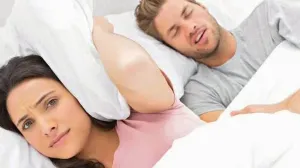Snoring and Sleep Apnea Treatment
Menu Bar

Snoring is the name given to the sound created by the airflow passing through these areas due to narrowing in the structures that form the upper respiratory tract such as the nose, soft palate, uvula and tongue base during sleep.
Sleep apnea is when breathing stops for 10 seconds or more during sleep. This condition is an important disease that causes disruption of sleep patterns, and as a result of respiratory irregularity, the amount of oxygen in the blood decreases and the amount of carbon dioxide increases.
Snoring is a symptom and apnea is a serious disease. Not every person who snores may have sleep apnea. Snoring is a common occurrence in patients with sleep apnea.
Sleep apnea may occur due to a problem in the central nervous system (brain) or an obstruction in the airways. Rarely, both conditions may occur together.
Untreated sleep apnea can lead to serious problems such as heart attack, high blood pressure, heart rhythm disturbances, stroke, impotence, and even death while sleeping. It may cause work or traffic accidents, work inefficiency and social problems due to excessive sleepiness during the day.
It can be seen in all age groups, and is usually observed in children due to large tonsils and adenoids. In adults, the incidence is very high in those who have nose or throat problems that block the airway, those whose lower jaw is born backwards, those who are overweight, alcohol and cigarette addicts, thyroid patients, and those who use allergy medication, muscle relaxants or sedatives.
To make a definitive diagnosis, patients must undergo a sleep test (polysomnography). As a result of this test, snoring and apnea are diagnosed and apnea can be graded (mild, moderate, severe).
In the treatment, weight loss, treatment of metabolic diseases, avoidance of active drugs, alcohol and cigarettes, jaw and tongue appliances, and sleeping positions are important. However, if the problem persists despite all these, different surgical techniques are applied to the nose, soft palate, base of the tongue and pharynx, either alone or together. Devices that deliver compressed air through the nose during sleep, called PAP, are given to patients who do not benefit from treatment or who have severe apnea.


